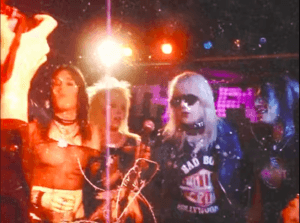Iron Maiden in Yugoslavia: Muddy Debut and The Festival Fiasco of 1981
In honor of the recently passed legendary first vocalist of Iron Maiden, Paul Di’Anno, we bring you a text from our archives from the non-English version of the Junkyard Rock Stories site about Iron Maiden’s debut performance in Serbia, or rather, the former Yugoslavia.
Specifically, it’s an excerpt that relates to the first concert of the legendary English heavy metal band in the capital of Yugoslavia in 1981, when the band was led by none other than Paul Di’Anno himself. This is probably a little-known story on a global scale, but true fans of Iron Maiden will certainly find it interesting.
It all began back in 1981, on the second day of a major music festival called “Svi Marš Na Ples” (Everyone to the Dance) in Belgrade on September 6th that was held on a huge racetrack field. The festival featured big domestic bands of the time such as Bijelo Dugme, Atomsko Sklonište, Divlje Jagode, as well as Haustor, Film, Aerodrom, and even two Hungarian bands. However, the stars of the night were the rising English band Iron Maiden, led by vocalist Paul Di’Anno. Or, maybe that wasn’t quite the case…
It is also interesting that Iron Maiden were not originally scheduled to play at this festival. The international guest star was supposed to be Eric Clapton, who suddenly fell ill, so the rising young English metal band was invited as a replacement.

The entire festival is remembered for its disastrously bad organization. At that time, there were electricity restrictions in place, so generators were rented from the near Film City for the festival. And only two of them, while at least six were needed. Because of this, the sound and lighting were awful. In such conditions, Iron Maiden, consisting of Steve Harris, Paul Di’Anno, Dave Murray, Adrian Smith, and Clive Burr, agreed to perform at 6 p.m. to avoid a lighting fiasco, which resulted in them being the opening act for Bijelo Dugme. The band that was at that time considered the biggest Yugoslav rock band. There were only two water taps at the racecourse and toilets that were hastily built, making the whole experience disastrous in that regard as well, with long queues forming. Plus, the whole event took place in biblical mud. Steve Harris himself described it as a complete fiasco:
“When we arrived, I was surprised we hadn’t been arrested and thrown in jail already! I heard that happens often here. I couldn’t believe it when I saw the stage – they were just planks nailed together! The stage didn’t even have a roof, so if it rained, everything would probably explode.”
In his book “Iron Maiden – In the Sign of the Beast”, Serbian journalist Branko Rogošić documented Steve Harris’ statements about this performance in Belgrade.
“Obviously, foreign bands don’t come here. Everyone uses the same amplifiers, drums, and stage equipment. There’s almost no stage lighting. It’s just wooden planks! There’s no roof, so if it rains, everything will explode. The audience is very far away. Someone announced over the PA system that we had arrived, and the crowd went crazy. As I mentioned before, not many Western bands have played here, so our arrival means that much to them.”
Steve Harris also recalled how he and the band explored Belgrade the day before the show, when Dave Murray went missing, later revealing he had gone to a strip club and had a great time, while the rest of the band visited an unimpressive local club. On the day of the concert, Iron Maiden arrived at the venue around noon, where 5,000 fans had camped overnight. Their equipment had been sent directly to Scandinavia, so they had to use outdated gear at the racetrack, (which was used by all bands), climbing onto the stage with beer crates. Despite the subpar setup, including malfunctioning monitors and drums, the band played a brief soundcheck, which drove the crowd wild.
Due to electrical issues, the band performed earlier than scheduled, in front of a crowd of around 20,000. Harris’ amplifier malfunctioned during the show, giving him a poor sound, but the band managed to deliver their set. Despite the equipment failures, Steve Harris recalled that the audience was incredibly enthusiastic, prompting an encore with “Drifter.” After the gig, the band returned to their hotel, but when they attempted to go out for drinks, they discovered that all bars in Yugoslavia closed by 10:30 p.m., adding to their frustrations. Though the concert was challenging, the fans’ energy and enthusiasm left a lasting impression which led to a unbreakable bond between the fans from this region and the band.
Iron Maiden has since played six more times in the capital of Serbia, formerly Yugoslavia, including a concert at Hala Pionir in 1986, when the song “Loneliness of the Long Distance Runner” was performed for the first and only time to date.
You can read the original text in Serbian language – here.
— Want more news and stories from Junkyard as it happens? Follow us on WhatsApp or Telegram.—
Iron Maiden’s first concert in Belgrade Serbia, or rather Yugoslavia, went as it went. On the Killer World Tour at the time, Maiden logically played songs from their only two albums at that point.
Setlist:
- Sanctuary
- Purgatory
- Wrathchild
- Twilight Zone
- Remember Tomorrow
- Genghis Khan
- Killers
- Another Life
- Innocent Exile
- Running Free
- Murders in the Rue Morgue
- Phantom of the Opera
- Iron Maiden
- Drifter
- Prowler
To wrap up, here are some facts about Yugoslavia. While Yugoslavia was a communist country, unlike the Eastern Bloc countries, it was not behind the so-called Iron Curtain. As a nation that did not belong to either of the two major Cold War blocs and actually led the “Non-Aligned Movement,” Yugoslavia was much more open to Western values, including rock ‘n’ roll. Consequently, the Yugoslav rock scene existed as early as the 1960s and continued to thrive in all the republics of the former Yugoslavia, which was not the case in other communist countries in Europe. A concert like this one by Iron Maiden would have been unimaginable in the USSR or other Eastern European countries at the time. Yugoslavia, on the other hand, nurtured a vibrant music scene and hosted various European and international bands several times throughout the 1980s.




